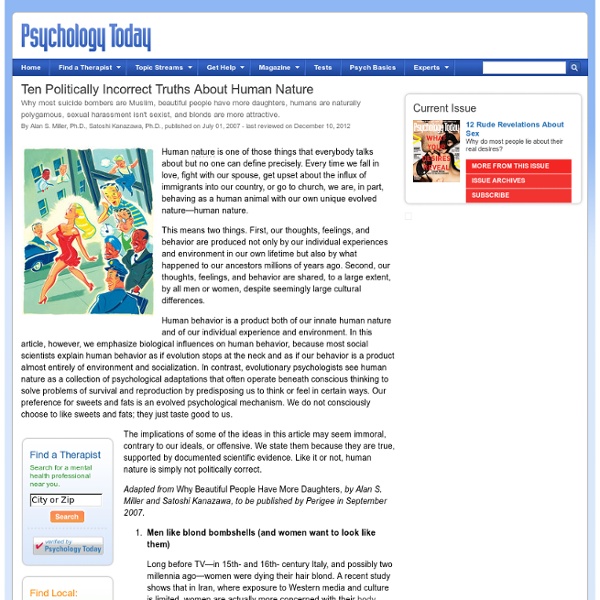Discovering Assumptions
The instructor strode into the classroom empty handed. He nodded to the class and checked his watch. Seven P.M.
Procrastination: Ten Things To Know
Is your procrastination hindering you? Ten things you should know. There are many ways to avoid success in life, but the most sure-fire just might be procrastination . Procrastinators sabotage themselves. They put obstacles in their own path. They actually choose paths that hurt their performance.
List of Cognitive Biases
Cognitive biases are tendencies to think in certain ways that can lead to systematic deviations from a standard of rationality or good judgment, and are often studied in psychology and behavioral economics. There are also controversies over some of these biases as to whether they count as useless or irrational, or whether they result in useful attitudes or behavior. For example, when getting to know others, people tend to ask leading questions which seem biased towards confirming their assumptions about the person.
10 Life-Enhancing Things You Can Do in Ten Minutes or Less
It usually takes us much longer to change our moods than we’d like it to take. Here are ten things you can do in ten minutes or less that will have a positive emotional effect on you and those you love. . See it online at Oprah.com .
What is a logical fallacy?
A "fallacy" is a mistake, and a "logical" fallacy is a mistake in reasoning. There are, of course, other types of mistake than mistakes in reasoning. For instance, factual mistakes are sometimes referred to as "fallacies". However, The Fallacy Files is specifically concerned with logical errors, not factual ones.
How the Brain Stops Time
One of the strangest side-effects of intense fear is time dilation, the apparent slowing-down of time. It's a common trope in movies and TV shows, like the memorable scene from The Matrix in which time slows down so dramatically that bullets fired at the hero seem to move at a walking pace. In real life, our perceptions aren't keyed up quite that dramatically, but survivors of life-and-death situations often report that things seem to take longer to happen, objects fall more slowly, and they're capable of complex thoughts in what would normally be the blink of an eye. Now a research team from Israel reports that not only does time slow down, but that it slows down more for some than for others.
Hedgehog's Dilemma
Both Arthur Schopenhauer and Sigmund Freud have used this situation to describe what they feel is the state of individual in relation to others in society. The hedgehog's dilemma suggests that despite goodwill, human intimacy cannot occur without substantial mutual harm, and what results is cautious behavior and weak relationships. With the hedgehog's dilemma, one is recommended to use moderation in affairs with others both because of self-interest, as well as out of consideration for others. The hedgehog's dilemma is used to explain introversion and isolationism. Schopenhauer[edit] The concept originates in the following parable from the German philosopher Arthur Schopenhauer's Parerga und Paralipomena, Volume II, Chapter XXXI, Section 396:[1]
Top 10 Explanations for The Bermuda Triangle
The Bermuda Triangle, as we call it today, was coined by the writer Vincent Gaddis in 1964 when he wrote a cover story for Argosy magazine about the strange disappearance of Flight 19. Also known as ‘The Devil’s Triangle’ or the ‘Isle of Devils’, the Bermuda Triangle is popularly thought to be an area in the Atlantic Ocean off the coast of Florida to one small island in Bermuda to an island in Puerto Rico. From point to point the area spans into an imaginary triangle. According to many scientists today, however, the only boundaries it truly defines are the ones between fantasy and fiction. The Bermuda Triangle is inaccurately known as a place where more ships and planes have mysteriously disappeared than anywhere else in the world, but why? Here are the top ten reasons the Bermuda Triangle has received a reputation as a possible epicenter of alien abductions, ghost ships, sea monsters, time portals, and other madness and mayhem.
Logical Problems - Very Easy
Logic Puzzles <p style="font-style:bold; color:red"> Warning: Solutions are currently displayed. To hide and show the solutions as desired, enable javascript on your browser </span></p> 1. The Camels Four tasmanian camels traveling on a very narrow ledge encounter four tasmanian camels coming the other way.
How We Shoot Ourselves in the Foot in Committed Relationships
Falling in love is as natural as death. Staying in love is as natural as good diet and healthy exercise. We can eat, exercise, and love well in the short run, but over the long haul of everyday modern living, we tend to shoot ourselves in the foot. That's because, like toddlers, we try to do these things in the wrong part of our brains. Below are two of the major ways we shoot ourselves in the foot when it comes to love.
Faulty Human Thought
Humans This list is a follow up to Top 10 Common Faults in Human Thought. Thanks for everyone’s comments and feedback; you have inspired this second list! It is amazing that with all these biases, people are able to actually have a rational thought every now and then.
List of common misconceptions
From Wikipedia, the free encyclopedia This incomplete list is not intended to be exhaustive. This list corrects erroneous beliefs that are currently widely held about notable topics. Each misconception and the corresponding facts have been discussed in published literature. Note that each entry is formatted as a correction; the misconceptions themselves are implied rather than stated. Arts and culture



